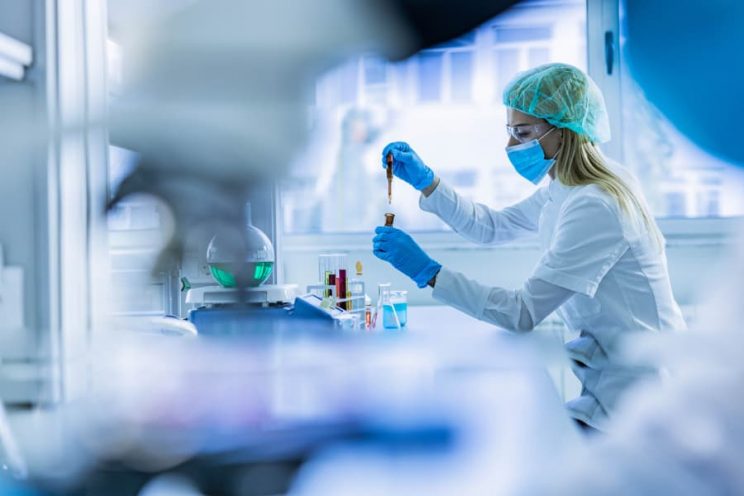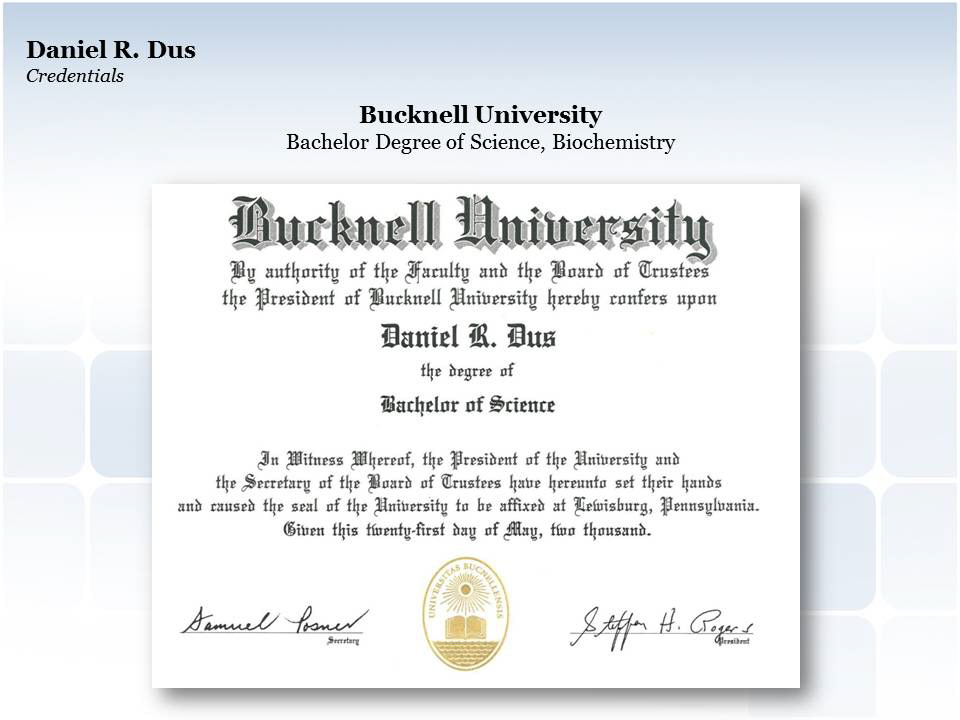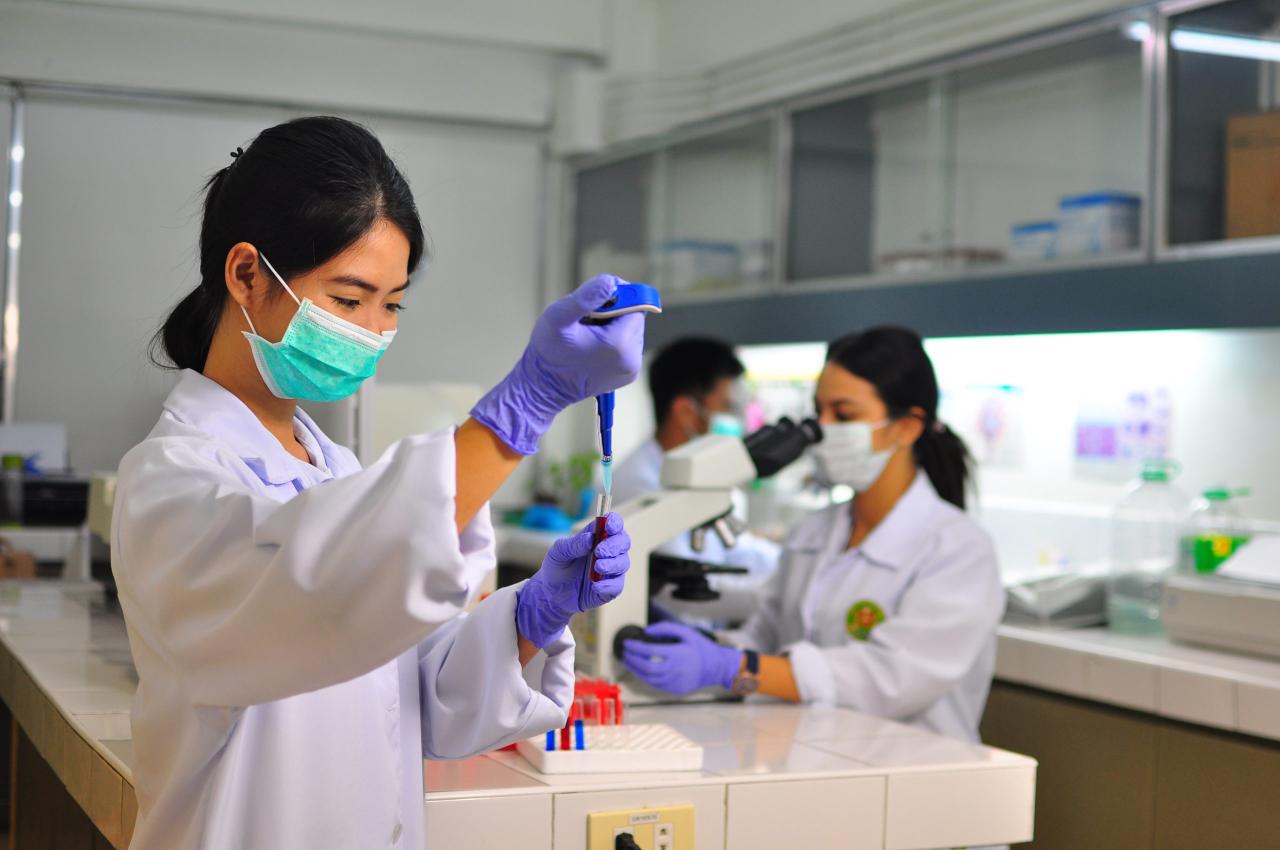
A bachelor’s degree in biology opens doors to a world of scientific exploration and discovery. It’s a journey that delves into the intricate mechanisms of life, from the smallest cells to the vast ecosystems that shape our planet.
This degree equips students with a comprehensive understanding of biological principles, allowing them to analyze complex systems, conduct research, and contribute to advancements in various fields like medicine, agriculture, and environmental conservation. The curriculum is a blend of theoretical knowledge and hands-on experience, fostering critical thinking, problem-solving, and communication skills essential for a successful career in the life sciences.
What is a Bachelor’s Degree in Biology?

A Bachelor’s Degree in Biology is an undergraduate program that provides a comprehensive understanding of living organisms and their interactions with the environment. This degree equips students with the foundational knowledge and skills necessary to pursue various careers in the biological sciences.
Core Principles and Foundational Knowledge
The core principles and foundational knowledge covered in a biology degree program are diverse and encompass various aspects of life. Students delve into the fundamental principles of biology, including cell structure and function, genetics, evolution, ecology, and the diversity of life. They also learn about the scientific method, experimental design, data analysis, and scientific communication.
Specializations within Biology
Biology is a vast field with numerous specializations. Students can choose to focus their studies on specific areas of interest within biology, such as:
- Molecular Biology: This specialization explores the structure, function, and interactions of biological molecules, including DNA, RNA, and proteins. Molecular biologists often work in research laboratories, developing new technologies and therapies.
- Ecology: Ecology focuses on the interactions between organisms and their environment. Ecologists study populations, communities, and ecosystems, often working in conservation, environmental management, or research.
- Genetics: This specialization examines the inheritance and expression of genes. Geneticists work in research, healthcare, and agriculture, developing new genetic technologies and treatments.
- Biochemistry: Biochemistry combines biology and chemistry to study the chemical processes within living organisms. Biochemists often work in research, pharmaceutical companies, or biotechnology.
- Microbiology: This specialization focuses on the study of microorganisms, such as bacteria, viruses, and fungi. Microbiologists work in healthcare, research, and food production.
- Zoology: Zoology explores the diversity, behavior, and evolution of animals. Zoologists work in research, conservation, and education.
- Botany: Botany focuses on the study of plants, including their structure, function, and evolution. Botanists work in research, agriculture, and conservation.
Career Paths and Industries
A Bachelor’s Degree in Biology opens doors to a wide range of career paths in various industries. Biology graduates are employed in:
- Research: Many biology graduates pursue research careers in academia, government agencies, or private companies. They conduct experiments, analyze data, and publish scientific findings.
- Healthcare: Biology graduates can work in healthcare settings as researchers, lab technicians, or healthcare professionals. They may develop new treatments, diagnose diseases, or provide patient care.
- Environmental Management: Biology graduates are essential for environmental protection and management. They work in government agencies, conservation organizations, or private companies, developing sustainable practices and protecting ecosystems.
- Education: Biology graduates can pursue careers in teaching at various levels, from primary schools to universities. They share their knowledge and passion for biology with students.
- Biotechnology: The biotechnology industry offers numerous opportunities for biology graduates. They work in research, development, and production of new products, such as pharmaceuticals, diagnostics, and agricultural products.
- Government: Biology graduates can work for government agencies, such as the Centers for Disease Control and Prevention (CDC) or the Environmental Protection Agency (EPA), conducting research, monitoring public health, and protecting the environment.
Curriculum and Coursework

A bachelor’s degree in biology typically involves a comprehensive curriculum designed to provide students with a strong foundation in the principles and methodologies of biological science. The coursework is structured to cover a wide range of topics, from the molecular level to the ecosystem level, preparing graduates for diverse career paths in research, healthcare, education, and other fields.
The curriculum generally includes a combination of core courses and elective options, allowing students to tailor their studies to their specific interests.
Core Courses
Core courses form the foundation of a biology degree, providing students with a comprehensive understanding of fundamental biological principles. These courses typically cover essential topics such as:
- Cell Biology: This course explores the structure, function, and organization of cells, the basic units of life. It examines the various cellular components, including the nucleus, cytoplasm, organelles, and their roles in cellular processes such as metabolism, protein synthesis, and cell division.
- Genetics: This course delves into the study of genes, heredity, and genetic variation. It covers topics like DNA structure, gene expression, inheritance patterns, mutations, and genetic engineering.
- Ecology: This course investigates the interactions between organisms and their environment. It examines concepts such as population dynamics, community structure, ecosystem function, and conservation biology.
- Evolution: This course explores the mechanisms of evolution, including natural selection, genetic drift, and speciation. It examines the evidence for evolution and its implications for understanding the diversity of life on Earth.
- Biochemistry: This course focuses on the chemical processes that occur within living organisms. It examines the structure and function of biomolecules such as carbohydrates, lipids, proteins, and nucleic acids.
- Physiology: This course explores the functions of living organisms, including their organ systems and how they work together to maintain homeostasis. It covers topics such as respiration, circulation, digestion, and excretion.
- Microbiology: This course examines the world of microorganisms, including bacteria, viruses, fungi, and protists. It covers topics such as microbial structure, growth, metabolism, and their roles in disease, biotechnology, and the environment.
Laboratory Work, Bachelor’s degree in biology
Laboratory work is an integral part of a biology degree, providing students with hands-on experience in applying theoretical knowledge to practical situations. Laboratory courses typically involve:
- Conducting experiments: Students design and execute experiments to test hypotheses and collect data.
- Analyzing data: Students use statistical methods to analyze data and draw conclusions.
- Developing research skills: Students learn to interpret experimental results, communicate findings effectively, and collaborate with others.
Research Projects
Many biology programs offer opportunities for students to participate in research projects, either independently or under the guidance of faculty mentors. Research projects provide students with valuable experience in:
- Formulating research questions: Students learn to identify research problems and develop testable hypotheses.
- Designing and conducting research: Students gain practical experience in experimental design, data collection, and analysis.
- Presenting research findings: Students learn to communicate their research results effectively through written reports, oral presentations, and scientific publications.
Fieldwork
Fieldwork is an essential component of some biology programs, particularly those focused on ecology, conservation, or environmental science. Fieldwork provides students with:
- Real-world experience: Students apply their knowledge in real-world settings, such as forests, wetlands, or marine environments.
- Hands-on data collection: Students learn to collect data in the field, using techniques such as sampling, observation, and monitoring.
- Understanding ecological processes: Students gain a deeper understanding of the interactions between organisms and their environment.
Skills and Competencies Developed
A Bachelor’s degree in Biology equips graduates with a diverse set of skills and competencies that are highly sought after in various fields. These skills are developed through rigorous coursework, hands-on laboratory experiences, and research opportunities.
Critical Thinking and Problem-Solving
Critical thinking and problem-solving are essential skills in biology, as they allow individuals to analyze complex biological phenomena, formulate hypotheses, and design experiments to test those hypotheses. Biology students develop these skills through various coursework, including:
- General Biology: Introduces fundamental concepts in biology, such as cell structure, genetics, and evolution, fostering critical thinking through the analysis of biological processes and phenomena.
- Biochemistry: Explores the chemical basis of life, encouraging critical thinking through the understanding of complex metabolic pathways and enzyme kinetics.
- Genetics: Studies the mechanisms of inheritance and genetic variation, developing critical thinking through the analysis of genetic data and the interpretation of experimental results.
- Ecology: Investigates the interactions between organisms and their environment, fostering critical thinking through the analysis of ecological data and the development of solutions to environmental problems.
These courses provide students with the foundation to approach biological problems systematically, break them down into manageable components, and develop logical solutions.
Scientific Research and Data Analysis
Scientific research is an integral part of biology, and a Bachelor’s degree program provides students with the necessary skills to conduct research and analyze data.
- Laboratory Courses: Hands-on laboratory experiences allow students to gain practical experience in experimental design, data collection, and analysis, building a strong foundation in scientific methodology.
- Research Projects: Undergraduate research projects provide students with the opportunity to apply their knowledge and skills to real-world research questions, developing their ability to design experiments, collect and analyze data, and interpret results.
- Biostatistics: This course introduces students to statistical methods used in biological research, enabling them to analyze data effectively and draw meaningful conclusions.
The ability to conduct research and analyze data is highly valuable in various fields, from academia and industry to government and healthcare.
Communication Skills
Effective communication is crucial for biologists to disseminate their findings, collaborate with colleagues, and engage with the public. Biology programs emphasize the development of both written and oral communication skills.
- Scientific Writing: Students learn to write clear, concise, and accurate scientific reports, proposals, and publications, following established scientific writing conventions.
- Oral Presentations: Through seminars, presentations, and conferences, students develop their ability to communicate complex scientific concepts effectively to diverse audiences, both technical and non-technical.
These skills are essential for success in research, teaching, and other careers that involve communicating scientific information.
Importance and Relevance in Today’s World
A Bachelor’s degree in Biology is not just an academic pursuit; it’s a key to understanding and tackling the world’s most pressing challenges. Biology is at the forefront of innovation, offering solutions to issues like climate change, disease outbreaks, and food security.
Impact on Global Challenges
Biology plays a crucial role in addressing global challenges. Here are some examples:
- Climate Change: Biologists are studying the impact of climate change on ecosystems and developing strategies for mitigating its effects. This includes researching renewable energy sources, understanding carbon sequestration, and developing climate-resilient crops.
- Disease Outbreaks: Biologists are essential in understanding the spread and control of infectious diseases. They work on vaccine development, disease surveillance, and public health initiatives to prevent and treat outbreaks.
- Food Security: Biology is vital in ensuring global food security. Biologists are researching sustainable agricultural practices, developing pest-resistant crops, and improving food production methods to meet the growing demand for food.
Advancements in Medicine, Agriculture, and Environmental Conservation
Biological research is driving advancements in various fields:
- Medicine: Biology has revolutionized medicine. Advancements in genetics, immunology, and biotechnology have led to new treatments for diseases, gene therapies, and personalized medicine. Biologists are also developing new diagnostic tools and understanding the human microbiome to improve healthcare.
- Agriculture: Biologists are developing genetically modified crops that are more resistant to pests, diseases, and environmental stresses. They are also researching sustainable farming practices to improve crop yields and reduce environmental impact.
- Environmental Conservation: Biology is crucial for understanding and protecting biodiversity. Biologists are studying ecosystems, wildlife conservation, and environmental pollution to develop strategies for preserving our planet’s natural resources.
Contribution to Innovation and Technological Development
Biology graduates contribute significantly to innovation and technological development:
- Biotechnology: Biologists are developing new technologies in areas like gene editing, biofuels, and bioremediation. These technologies have the potential to solve problems in healthcare, agriculture, and environmental protection.
- Bioinformatics: Biologists are using computational tools to analyze large datasets, understand complex biological systems, and develop new drugs and therapies.
- Bioengineering: Biologists are applying engineering principles to develop new biomaterials, biodevices, and bio-inspired technologies.
Final Conclusion

A bachelor’s degree in biology is a powerful foundation for a rewarding career in the life sciences. Whether you’re passionate about unraveling the secrets of the human body, developing sustainable solutions for environmental challenges, or pushing the boundaries of scientific knowledge, a biology degree can be your key to unlocking a world of possibilities.
FAQ Overview
What are the admission requirements for a biology degree program?
Admission requirements vary by university, but typically include a high school diploma, strong academic performance in science and math courses, and standardized test scores like the SAT or ACT. Some programs may also require letters of recommendation and a personal essay.
What are the job prospects for biology graduates?
Biology graduates have a wide range of career options, from research scientists and biotechnologists to environmental consultants and teachers. The field is constantly evolving, creating new opportunities for innovation and problem-solving.
Is a biology degree relevant for careers outside of the life sciences?
Yes, a biology degree provides valuable skills that are transferable to various industries. Critical thinking, problem-solving, data analysis, and communication skills are highly sought-after in fields like healthcare, business, and technology.




